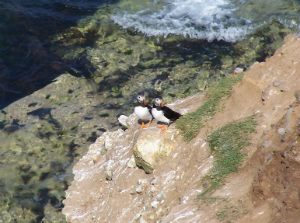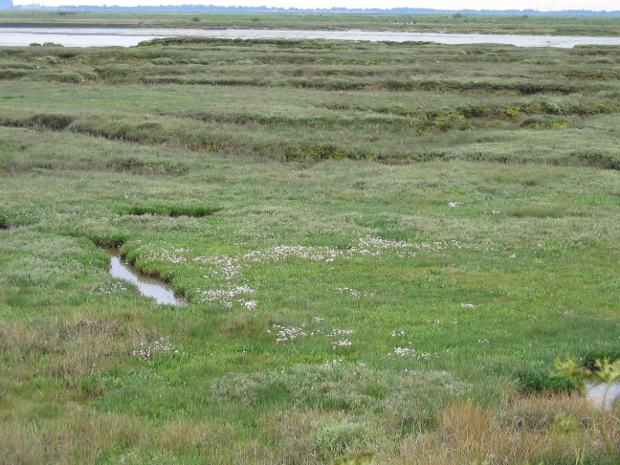 Coastal zones1 play an important role in environmental life support and quality, as well as contributing to economic, social and cultural aspects of human society and its wellbeing. Recent thinking has emphasized the need to manage our coasts in a more comprehensive and flexible way, with due regard to better conserving natural habitats for their own sake, while also seeking to maximize the socio-economic and cultural benefits that humans derive from them.
Coastal zones1 play an important role in environmental life support and quality, as well as contributing to economic, social and cultural aspects of human society and its wellbeing. Recent thinking has emphasized the need to manage our coasts in a more comprehensive and flexible way, with due regard to better conserving natural habitats for their own sake, while also seeking to maximize the socio-economic and cultural benefits that humans derive from them.
These so-called ‘ecosystem services’ provide significant human well-being benefits, only some of which can be expressed in monetary terms. Management of coastal areas poses a particular challenge, however, because of the constant changes from land and sea that these areas are subject to.
Links to: Aims, Outputs, The team
Aims
 The Coastal Management project set up a network of people from many different research areas to get a better understanding of the importance of the coastal and marine environment to people: e.g. in terms of jobs, health and recreation and amenity.
The Coastal Management project set up a network of people from many different research areas to get a better understanding of the importance of the coastal and marine environment to people: e.g. in terms of jobs, health and recreation and amenity.
This project aimed to:
- better define, quantify and value coastal ecosystem services and benefits, and
- distinguish between the ‘stock’ position, i.e. the available amount of coastal ecosystem services at a given point in time, and the ‘flow’ position, i.e. the incremental changes in the supply of services over time.
The findings of this research project will contribute to policies based on spatial planning and marine protected areas, such as the EU Marine Strategy Framework Directive (MSFD).
Objectives
The coastal zone provides the dynamic transition (across time and space) between terrestrial and marine domains, while containing highly diverse natural systems. Coastal process and ecosystem changes range over a variety of spatial and temporal scales and can only be better understood and managed on the basis of an interdisciplinary ‘knowledge’ and’ know how’.
This project investigated these questions:
- Following the National Ecosystem Assessment conceptual framework, can we characterise individual/groups of ecosystem services, their beneficiaries and their distributional patterns for coastal systems sufficiently well to allow evaluation via monetary/non-monetary methods? This requires stock, flow, threshold and substitution analysis.
- Is the 'Drivers, Pressures, State, Impact and Response' scoping framework and available futures scenarios sufficient to identify the main drivers of environmental change in coastal zones, and therefore behavioural incentives across multiple actors, jurisdictions and agencies?
- Can we quantify natural ecosystem services and understand the controls on these processes? For example, forcing via catchment land use and other changes and marine shelf exchange.
- Do we have adequate indicators of changes in the stocks of coastal ecosystem services and, if not, what new indicators are feasible?
- Do we have an adequate understanding of how stock levels influence flows and potential thresholds within stock levels?
- Can we aggregate and organize natural ecosystem function information to allow effective integration into social science valuations?
- What social science knowledge/data and methods exist to meaningfully ‘value’ coastal ecosystem services and what gaps need to be filled, or new/hybrid methods need to be developed?
- Can we identify any major mismatches between natural and social science data/findings which serve to inhibit a proper evaluation of ecosystem services (direct and indirect effects)?
Decision-making
- Administrative boundaries and natural system boundaries often do not match, and social networks of stakeholders vary in size and influence. What governance problems therefore need to be highlighted and how might they be addressed?
- What overall decision support systems are required to better inform adaptive coastal management in the future? In the light of the prevailing uncertainties in terms of science and its data, as well as social uncertainties in multiple possible futures, what are the best ways to proceed in taking decisions shrouded by lack of knowledge or even complete ignorance?
- How can the valuation of coastal ecosystem services be implemented in a variety of policy and management contexts? What would be the ramifications for coastal communities in selected case studies?
- Given the ‘contested’ nature of coastal socio-ecological resource systems, questions of trade-offs and social justice equity and compensation are likely to loom large in public debate. Appropriate decision support systems are therefore likely to be informed, for example, by a better understanding of relevant social and policy networks; and via methods and techniques encompassing multiple decision criteria.
Outputs
Threats to coastal zone ecosystem services
- Coastal zones supply many valuable ecosystem services but this supply is under threat from a combination of socio-economic and environmental and climate change drivers.
- A more adaptive and flexible policy response is required in future (one that goes beyond just the construction of engineered flood defence structures) to meet these challenges and to maintain, as far as is feasible, existing coastal environments and human communities.
- The ecosystem services framework can help to highlight the need to ‘work with nature’ as much as possible in order to respond efficiently and effectively, especially given the prevailing national and global financial recession.
Valuing ecosystem services
Given the National Ecosystem Assessment conceptual framework, this project has proposed a particular interpretation of the ecosystem services stock and flow concepts in order to distinguish between the monetary accounting value of the ecosystem services stock (at a given point in time, and analogous to the economic activity measure Gross Domestic Product GDP); and the economic (marginal) value of incremental changes in flows of ecosystem services over time.
These monetary estimates can serve to emphasise the ‘significance’ of ecosystem services to the economy and human welfare, and may carry further traction with Finance Ministries and their thinking because they are explicitly couched in monetary terms.
The approach adopted has served to re-emphasise how the basic ecosystem processes and structure that underpins the stock and flow of ecosystem services is fundamentally ‘valuable’ in its own right. Thus it is always the case that the total monetary economic value (related to the sum of the flow of ecosystem services) is less than total system value.
This has important implications for policy options appraisal and trade off decision making. It requires, among other things, that economic cost-benefit decision support analysis must be constrained by ‘regulations’ that reflect precautionary thinking if it is suspected that environmental ‘limits’, i.e. thresholds and irreversibilities (changes that cannot be reversed either because it is too costly to do so or technologically not feasible) may be approaching.
Policy-making: approach and tools
Coastal zones are subject to relatively rapid and complex environmental changes and policy responses should therefore be guided by principles such as:
- pluralism (i.e. get knowledge from a number of different disciplines, natural, social sciences and arts/humanities), and
- pragmatism and conditional rationality (i.e. do what you can to ‘improve’ matters now, rather than delaying to search for optimal solutions which probably require more evidence collected over long periods of time).
In other words, deploy interdisciplinary research to inform real world adaptive and timely decision making, accepting that there is always uncertainty and that in many cases decisions create ‘winners’ and ‘losers’. In simple terms this is a ‘learning by doing’ approach. In this context, the project has proposed the use and development of a decision support tool, the ‘balance sheets‘ method/approach, which seeks to provide a more comprehensive set of information to the policy process.
Indicators of change
The research began the process of identifying indicators of changes in ecosystem services provision in coastal areas.
The indicators set is being linked more closely to ecosystem functions and consequent services and represents a reduced form of the large (over 70) number of indicators originally identified in order to begin the MSFD implementation and make progress towards ‘Good Ecological Status’ conditions for coastal/marine waters.
It is not yet clear whether the indicator set will prove to be sufficient to construct a part of an ecosystem services (non-monetary) ‘account’ which could sit alongside National Income Accounts (traditional GDP and/or modified GDP welfare accounts).
Ecosystem services quantification
The research has quantified and evaluated a set of significant ecosystem services (carbon storage, fish nursery provision and recreation and amenity) for some large North Sea estuaries. The estimates of ‘blue carbon’ derived from saltmarshes and seagrass beds are highly policy relevant in the climate policy arena.
Marine Protected Areas
- A number of marine protected areas (MPAs) have been established or proposed.
- This research has identified the ecosystem services most likely to be conserved/provided under this spatial designation process.
- Matrices for the provision of ecosystem services provided by key designated features (habitats and species) have been constructed.
Who will be able to use the outputs?
The work contributed to the UK adoption of the EU Marine Strategy Directive and drew lessons from the implementation of the EU Water Framework Directive.
In addition to contributing to the Valuing Nature Network, this work will also contribute and link to the National Ecosystem Assessment, contribute to NERC programmes such as Macronutrients, Ocean Acidification, and Biodiversity & Ecosystem Service Sustainability (BESS), and build on EU and other international research projects.
The Team
Project Leader
Professor Kerry Turner - University of East Anglia
Project Mentors
Other members of the Coastal Management network research team include:
Steve Albon - Hutton Institute
Julian Andrews - University of East Anglia
Jon Atkins - University of Hull
Melanie Austen - Plymouth Marine Laboratory
Nicola Beaumont - Plymouth Marine Laboratory
Emma Bee - British Geological Survey
Daryl Burdon - University of Hull
Mark Everard - Environment Agency
Mike Elliott - University of Hull
Nick Hanley - University of Stirling
Emily Hastings - Hutton Institute
Emma Jackson - Marine Biological Association
Tim Jickells - University of East Anglia
Corinne Le Quere - Tyndall Centre
Katherine Kennedy - Cefas
Tiziana Luisetti - University of East Anglia
Stephen Malcolm - Cefas
Liam McAleese - Gardline Group
Laurence Mee - SAMS
Alex Midlen - CoastNet
Ece Ozdemiroglu - EFTEC
Ruth Parker - Cefas
Tavis Potts - SAMS
Joyashree Roy - Jadavpur University and LOICZ
Kerry Turner - University of East Anglia
Chris Vane - British Geological Survey
Bill Watts - Environment Agency
Ursula Witte - University of Aberdeen
1In line with International Geosphere-Biosphere Programme Land-Ocean Interactions in the Coastal Zone (LOICZ) we define the coastal zone as including river basins and catchments, estuaries and coastal seas and extending out to the continental shelf.
